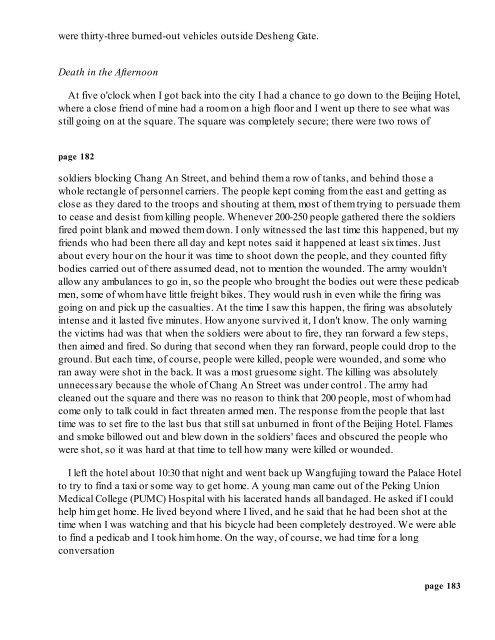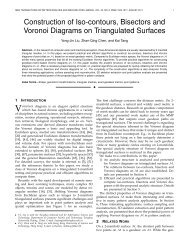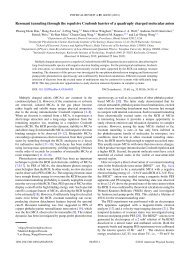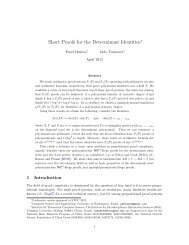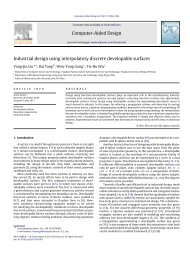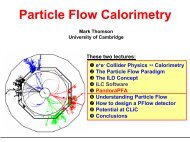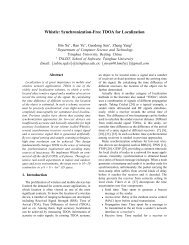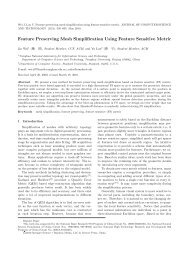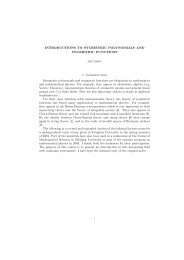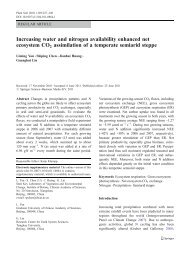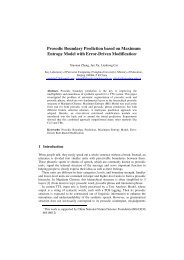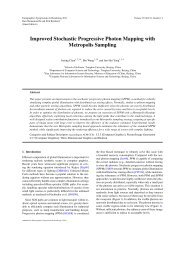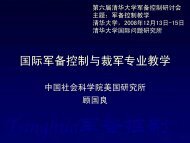THE GREAT REVERSAL The Privatization of China, 1978-1989 ...
THE GREAT REVERSAL The Privatization of China, 1978-1989 ...
THE GREAT REVERSAL The Privatization of China, 1978-1989 ...
You also want an ePaper? Increase the reach of your titles
YUMPU automatically turns print PDFs into web optimized ePapers that Google loves.
were thirty-three burned-out vehicles outside Desheng Gate.Death in the AfternoonAt five o'clock when I got back into the city I had a chance to go down to the Beijing Hotel,where a close friend <strong>of</strong> mine had a room on a high floor and I went up there to see what wasstill going on at the square. <strong>The</strong> square was completely secure; there were two rows <strong>of</strong>page 182soldiers blocking Chang An Street, and behind them a row <strong>of</strong> tanks, and behind those awhole rectangle <strong>of</strong> personnel carriers. <strong>The</strong> people kept coming from the east and getting asclose as they dared to the troops and shouting at them, most <strong>of</strong> them trying to persuade themto cease and desist from killing people. Whenever 200-250 people gathered there the soldiersfired point blank and mowed them down. I only witnessed the last time this happened, but myfriends who had been there all day and kept notes said it happened at least six times. Justabout every hour on the hour it was time to shoot down the people, and they counted fiftybodies carried out <strong>of</strong> there assumed dead, not to mention the wounded. <strong>The</strong> army wouldn'tallow any ambulances to go in, so the people who brought the bodies out were these pedicabmen, some <strong>of</strong> whom have little freight bikes. <strong>The</strong>y would rush in even while the firing wasgoing on and pick up the casualties. At the time I saw this happen, the firing was absolutelyintense and it lasted five minutes. How anyone survived it, I don't know. <strong>The</strong> only warningthe victims had was that when the soldiers were about to fire, they ran forward a few steps,then aimed and fired. So during that second when they ran forward, people could drop to theground. But each time, <strong>of</strong> course, people were killed, people were wounded, and some whoran away were shot in the back. It was a most gruesome sight. <strong>The</strong> killing was absolutelyunnecessary because the whole <strong>of</strong> Chang An Street was under control . <strong>The</strong> army hadcleaned out the square and there was no reason to think that 200 people, most <strong>of</strong> whom hadcome only to talk could in fact threaten armed men. <strong>The</strong> response from the people that lasttime was to set fire to the last bus that still sat unburned in front <strong>of</strong> the Beijing Hotel. Flamesand smoke billowed out and blew down in the soldiers' faces and obscured the people whowere shot, so it was hard at that time to tell how many were killed or wounded.I left the hotel about 10:30 that night and went back up Wangfujing toward the Palace Hotelto try to find a taxi or some way to get home. A young man came out <strong>of</strong> the Peking UnionMedical College (PUMC) Hospital with his lacerated hands all bandaged. He asked if I couldhelp him get home. He lived beyond where I lived, and he said that he had been shot at thetime when I was watching and that his bicycle had been completely destroyed. We were ableto find a pedicab and I took him home. On the way, <strong>of</strong> course, we had time for a longconversationpage 183


